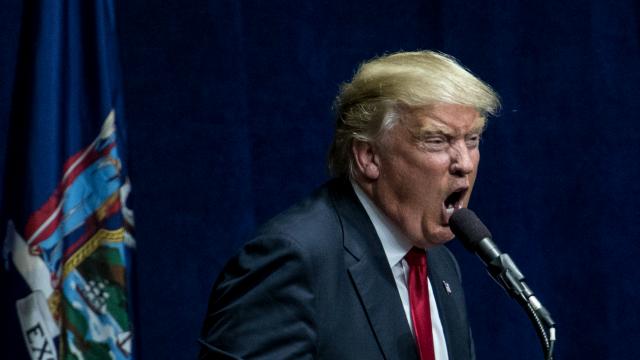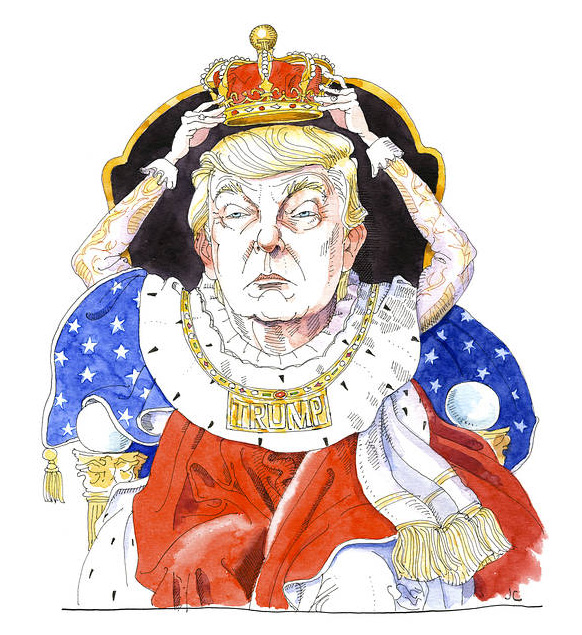
The United States was born in a revolt against the tyranny of King George III. The Constitution was designed to prevent tyranny through a system of checks and balances, but in President Trump's America, those safeguards are failing.
Donald Trump holds the grandiose belief that only he should rule America. Unchecked by cowed or complicit Republicans in Congress, Trump invokes executive authority to alter policies and practices long established by law and treaty.
Days after his summit meeting with Vladimir Putin, no one knows what the two autocrats agreed to, or even talked about -- not the President's top aides, nor the Pentagon, nor security establishment or Congress, never mind the rest of us. And in the midst of the ensuing uproar, Trump has invited Putin to Washington, without telling his top intelligence official and no doubt most other key aides and officials.
The list of one-man actions grows rapidly. Trump is single-handedly imposing hundreds of billions of dollars of tariffs -- that is, taxes -- on imported goods from key US allies and China, without any explicit or implicit Congressional backing.
Trump abrogated the Iran nuclear deal despite its unanimous support by the UN Security Council. Trump is in the process of imposing new and severe sanctions against Iran, including the cutoff of all of Iran's oil exports, against the international agreement with Iran and with no vote of Congress, presumably to try to topple the Iranian regime.
Not surprisingly, and perhaps as intended, Trump's drumbeat of belligerency triggered an ominous warning from Iran, and now an escalation from Trump, casting the increasingly ominous confrontation with Iran as yet another one-man Trump show.
Trump used executive authority without Congressional mandate to impose a travel ban on several Muslim-majority states; to announce the US withdrawal from the Paris Climate Agreement despite treaty-bound US obligations under the UN Framework Convention on Climate Change; and to change the status quo regarding Jerusalem against the will of the UN Security Council and UN General Assembly. Trump extended the stay of US troops in Syria without oversight or approval by Congress.
Political scientists are documenting America's descent toward one-man rule. A recent ranking of democracies around the world by the Swedish academic think-tank the V-Dem Institute put the US at the 31st position in 2017, a precipitous fall from 7th place in 2015. According to the report, "There is clear evidence of autocratization [the movement towards one-person rule] on several indicators.
"The lower quality of liberal democracy stems primarily from weakening constraints on the executive."
Similarly, the Democracy Index of The Economist Intelligence Unit now ranks the US only as a "flawed democracy."
Trump supporters argue that Trump is merely using his legal authority to the fullest. Yet the situation is worse than that. Simply by invoking the phrase "national security," Trump can push the Congress and Supreme Court to give him almost any degree of latitude. Trump's tariffs (under Section 232 of the Trade Expansion Act of 1962), the travel ban and his abrogation of the Iran nuclear deal were all made under the incantation of national security.
The Supreme Court, by a 5-4 majority, upheld the travel ban because the majority refused to second-guess the President on a claim of national security. Congress is almost completely supine on matters that the President declares to be about war and peace.
The Constitution is not supposed to work this way. Under Article I, Section 8, the power to wage war rests with Congress. So does the power to levy taxes and tariffs. Yet in each case, an aggressive President may invoke national security to circumvent the Congress. Congress's chronic failure to oversee presidential war-making, prolonged troop placements and overseas bases, with this president and earlier ones, is similarly notorious.
And Congress's failure to challenge Trump on his claims that Canada's steel and aluminum exports or China's consumer product exports constitute a "national security threat" is unforgivable.
Two long-term trends are at play, both exploited by Trump in his grab for power.
The first is the relentless growth of the national-security state since World War II, with America's hundreds of military bases and nonstop war-making around the world, including covert wars and influence campaigns run by the CIA. For more than half a century, Congress and the Supreme Court have tended to give presidents an almost free hand in starting wars, which are checked only later by the gradual mobilization of public opposition.
The second is the rise of corporate power in driving federal policy. As presidents implement the corporate agenda, Congress stands back. The Supreme Court, starting in the 1970s and continuing under Chief Justice John Roberts, has also championed the corporate lobby, giving the President a wide berth in promoting the corporate agenda. The Congress, in thrall to corporate lobbies, is complicit in letting the President unilaterally dismantle environmental and consumer-protection regulations.
Not all is lost. Special Counsel Robert Mueller and lower courts may still stand up to the President, even though the Supreme Court has become a predictable 5-4 backer of almost limitless presidential authority. Trump's assertion of power would also be counteracted if the Democrats win at least one of the chambers of Congress in November.
Yet these are fragile reeds. The US may well be one major war away from the collapse of American democracy, most likely a war with Iran for the regime change that Trump seeks. The Nazi henchman Hermann Göring explained in Nuremberg prison how easy it is to mobilize the public to war: "Voice or no voice, the people can always be brought to the bidding of the leaders. That is easy. All you have to do is tell them they are being attacked and denounce the pacifists for lack of patriotism and exposing the country to danger. It works the same way in any country."
Trump has started with a trade war, but we shouldn't be surprised if the trade war morphs into a hot one. We are far down the path to tyranny.












